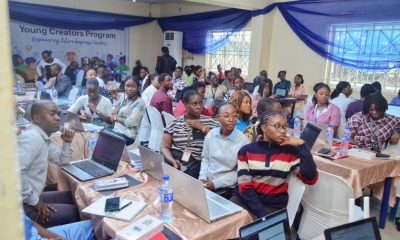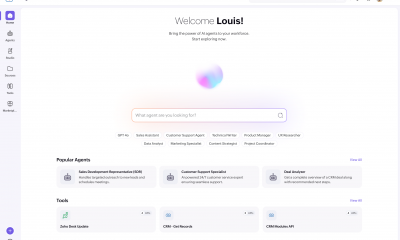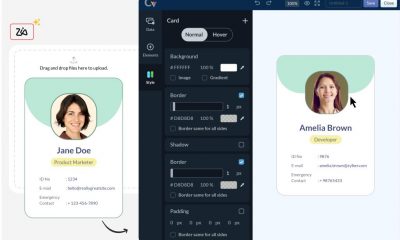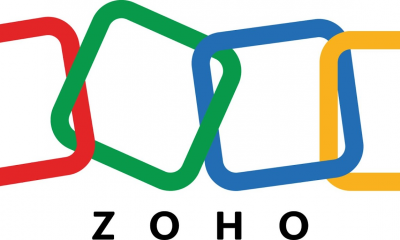Technology
The Future of IT: Democratising Application Development with Low-code Platforms
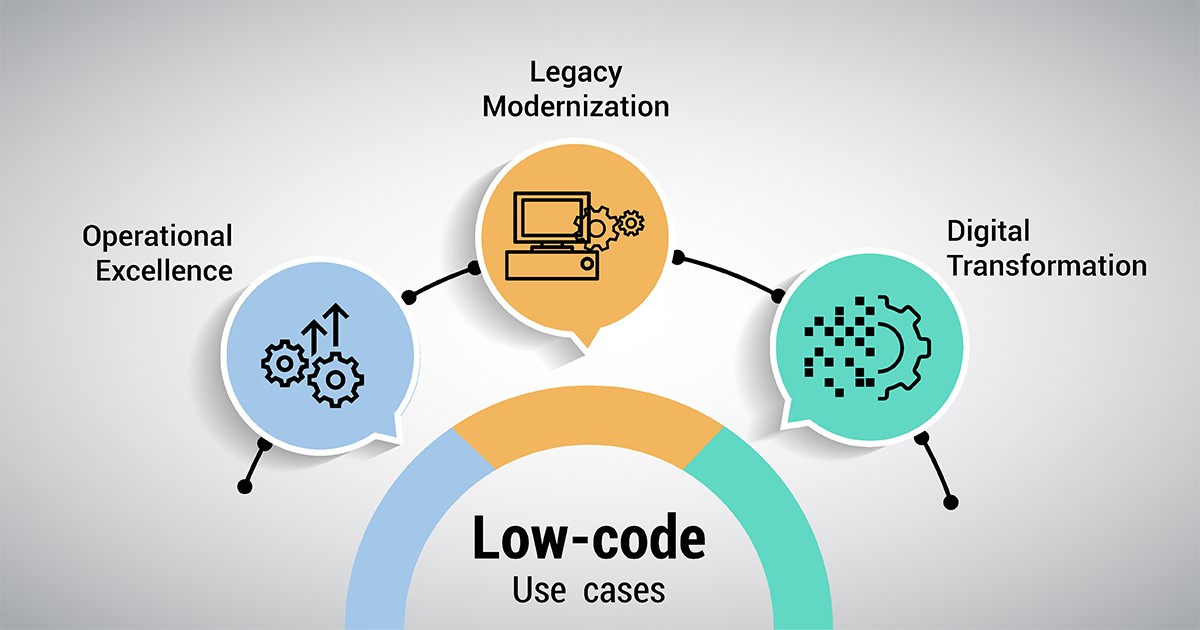
By Hyther Nizam
With COVID-19 accelerating the digital transformation of businesses, many organisations were forced to adopt a work-from-home strategy, and customers began to increasingly purchase goods and services online. The outbreak highlighted the critical nature of software and its impact on people’s lives, both professionally and personally.
At the same time, the function of the IT department has evolved and it has been crucial in supporting organisations in shifting to a new way of working. While numerous departments have seen budget cuts, many businesses have increased their IT spending. This is because the department, now expected to complete more tasks more quickly, is vital to the success of a business.
The rise of low-code app development platforms
To accommodate the unexpected change in business, working apps and systems had to be developed and deployed in the shortest period possible. With IT departments now playing such a critical role in strategic business development, the evolution of low-code and no-code (L/N) has helped to lighten the IT load for businesses of all sizes. According to Gartner, low code applications will account for more than 65% of all app development functions by 2024, with 66% of large organisations adopting at least four low-code platforms.
L/N development platforms allow for the rapid development of comprehensive technological solutions without the need for extensive programming skills. This makes life easier for business users, analysts, sales and marketing executives. In other words, those who are closest to the requirement and issue at hand are contextually more informed.
South African businesses that use low-code and no-code software benefit from the following:
Reduce the time it takes to develop and deploy innovative apps.
Reduce the strain on professional developers by ensuring that all business requirements are met while adhering to regulatory criteria for development methods and components.
Allow business users to give shape to their innovative and practical solutions without having to specialise in specific programming languages.
Bring together business and IT teams. Business developers can create applications within the constraints imposed by IT specialists. A centralised, simple-to-use development platform also enables the IT staff to monitor the development process and intervene as necessary. A New Jersey managed services provider can facilitate this collaboration by offering the tools and support needed to streamline development and ensure compliance.
Low-code platforms also help address the challenges posed by ‘Shadow IT’ or ‘Rogue IT’ practices, which often happens when business teams or individuals start using different tools to solve their problems without keeping their IT teams in the loop.
IT possibilities enabled by low-code platforms
Recently, businesses have successfully launched two types of apps employing the low-code application development paradigm, with some focusing completely on solutions as part of their pivotal strategies in the face of the pandemic.
Internal apps: Current conditions have sparked a rise in internal collaboration apps such as contact tracing, virtual check-in portals for remote employees, and COVID-19 live dashboards to name a few. From employee management to streamlining operations with automated approval processes, low-code platforms have played a vital role in allowing different types of users to ship critical solutions for automation, connectivity and communication, allowing thousands of employees to take their work home with them and for businesses to continue as usual with minimal disruptions. This is further enabled by the ability of modern low-code platforms to integrate with legacy systems and processes, allowing for web and mobile apps with seamless user experiences that can push and pull information from existing internal systems.
Customer-facing apps: Post lockdown announcements during the first wave of the pandemic, many businesses quickly rolled out self-service web portals and mobile apps, and extended their products and services to their customers digitally. For instance, a number of banks launched digital solutions for banking, loans, forex etc. Even the large, well-established banks that witness stiff competition from fintechs and neobanks (who are technically more flexible and savvy) are now able to compete successfully with the latter, thanks to low-code application platforms.
The potential for simpler business process automation, unencumbered by complex code structures or delivery delays, makes L/N platforms a strategic asset for any company. Not to mention the fact that we now have AI-assisted L/N platforms that can provide guided experience for non-programmers, assisting them in developing better applications through intelligent suggestions.
All things considered, low-code and no-code solutions will give businesses the freedom they have always needed to achieve true agility and innovation.
Hyther Nizam heads Zoho’s Middle East & Africa (MEA) operations and also leads some of the technology initiatives in Zoho which includes Zoho’s scripting language, Deluge
Technology
Telecom Operators to Issue 14-Day Notice Before SIM Disconnection

By Adedapo Adesanya
Telecommunications operators in Nigeria will now be required to give subscribers a minimum of 14 days’ notice before deactivating their SIM cards over inactivity or post-paid churn, following a fresh proposal by the Nigerian Communications Commission (NCC).
The proposal is contained in a consultation paper, signed by the Executive Vice Chairman and Chief Executive Officer of the NCC, Mr Aminu Maida, and titled Stakeholders Consultation Process for the Telecoms Identity Risks Management Platform, dated February 26, 2026, and published on the Commission’s website.
Under the proposed amendments to the Quality-of-Service (QoS) Business Rules, the Commission said operators must notify affected subscribers ahead of any planned churn.
“Prior to churning of a post-paid line, the Operator shall send a notification to the affected subscriber through an alternative line or an email on the pending churning of his line,” the document stated.
It added that “this notification shall be sent at least 14 days before the final date for the churn of the number.”
A similar provision was proposed for prepaid subscribers. According to the Commission, operators must equally notify prepaid customers via an alternative line or email at least 14 days before the final churn date.
Currently, under Section 2.3.1 of the QoS Business Rules, a subscriber’s line may be deactivated if it has not been used for six months for a revenue-generating event. If the inactivity persists for another six months, the subscriber risks losing the number entirely, except in cases of proven network-related faults.
The new proposal is part of a broader regulatory review tied to the rollout of the Telecoms Identity Risk Management System (TIRMS), a cross-sector platform designed to curb fraud linked to recycled, swapped and barred mobile numbers.
The NCC explained in the background section of the paper that TIRMS is a secure, regulatory-backed platform that helps prevent fraud stemming from churned, swapped, barred Mobile Station International Subscriber Directory Numbers in Nigeria.
It said this platform will provide a uniform approach for all sectors in relation to the integrity and utilisation of registered MSISDNs on the Nigerian Communications network.
In addition to the 14-day notice requirement, the Commission also proposed that operators must submit details of all churned numbers to TIRMS within seven days of completing the churn process, strengthening oversight and accountability in the system.
The consultation process, which the Commission said is in line with Section 58 of the Nigerian Communications Act 2003, will remain open for 21 days from the date of publication. Stakeholders are expected to submit their comments on or before March 20, 2026.
Technology
Silverbird Honours Interswitch’s Elegbe for Nigeria’s Digital Payments Revolution

By Modupe Gbadeyanka
The founder of Interswitch, Mr Mitchell Elegbe, has been honoured for pioneering Nigeria’s digital payments revolution.
At a ceremony in Lagos on Sunday, March 1, 2026, he was bestowed with the 2025 Silverbird Special Achievement Award for shaping Africa’s financial ecosystem.
The Silverbird Special Achievement Award recognises individuals whose innovation, vision, and sustained impact have left an indelible mark on society.
Mr Elegbe described the award as both humbling and symbolic of a broader journey, saying, “This honour represents far more than a personal milestone. It reflects the courage of a team that believed, long before it was fashionable, that Nigeria and Africa could build world-class financial infrastructure.”
“When we started Interswitch, we were driven by a simple but powerful idea that technology could democratise access, unlock opportunity, and enable commerce at scale.
“This recognition by Silverbird strengthens our resolve to continue building systems that empower businesses, support governments, and expand inclusion across the continent,” he said when he received the accolade at the Silverbird Man of the Year Awards ceremony attended by several other dignitaries, whose leadership and contributions continue to shape national development and industry transformation.
In 2002, Mr Elegbe established Interswitch after he was inspired by a bold conviction that technology could fundamentally redefine how value moves within and across economies.
Under his leadership, the company has evolved into one of Africa’s foremost integrated payments and digital commerce companies, powering financial transactions for governments, banks, businesses, and millions of consumers.
Today, much of Nigeria’s electronic payments ecosystem traces its foundational architecture to the systems and rails established under his leadership.
“Mitchell’s journey is inseparable from Nigeria’s digital payments evolution. His foresight and resilience helped establish foundational infrastructure at a time when the ecosystem was still nascent.
“This recognition affirms not only his personal legacy, but the broader impact of Interswitch in enabling commerce and strengthening financial systems across Africa,” the Executive Vice President and Group Marketing and Communications for Interswitch, Ms Cherry Eromosele, commented.
Technology
SERAP Seeks FCCPC Probe into Big Tech’s Impact on Nigeria’s Digital Economy

By Adedapo Adesanya
The Socio-Economic Rights and Accountability Project (SERAP) has called on the Federal Competition and Consumer Protection Commission (FCCPC) to urgently investigate major global technology companies over alleged abuses affecting Nigeria’s digital economy, media freedom, privacy rights and democratic integrity.
In a complaint addressed to the chief executive of FCCPC, Mr Tunji Bello, the group accused Google, Meta (Facebook), Apple, Microsoft (Bing), X, TikTok, Amazon and YouTube of deploying opaque algorithms and leveraging market dominance in ways that allegedly undermine Nigerian media organisations, businesses, and citizens’ rights.
The complaint, signed by SERAP Deputy Director, Mr Kolawole Oluwadare, urged the commission to take measures necessary to urgently prevent further unfair market practices, algorithmic influence, consumer harm and abuses of media freedom, freedom of expression, privacy, and access to information.”
SERAP also asked the FCCPC to convene a public hearing to investigate allegations of algorithmic discrimination, data exploitation, revenue diversion, and anti-competitive conduct involving the tech giants.
According to the organisation, dominant digital platforms now act as private gatekeepers of Nigeria’s information and business ecosystem, wielding enormous influence over public discourse and market competition without sufficient transparency or regulatory oversight.
“Millions of Nigerians rely on these platforms for news, information and business opportunities,” SERAP stated, warning that opaque algorithms and offshore revenue extraction models pose both economic and human rights concerns.
The group argued that the alleged practices threaten media plurality, consumer protection, privacy rights, and the integrity of Nigeria’s forthcoming elections.
SERAP pointed to actions taken by the South African Competition Commission, which investigated Google over alleged bias against local media content, adding that the South African probe reportedly resulted in measures including algorithmic transparency requirements, compliance monitoring and financial remedies.
SERAP urged the FCCPC to take similar steps to safeguard Nigerian media and businesses.
The organisation maintained that if established, the allegations could amount to violations of Sections 17 and 18 of the Federal Competition and Consumer Protection Act (FCCPA), which prohibit abuse of market dominance and anti-competitive conduct.
SERAP stressed that the FCCPC has statutory authority to investigate and sanction conduct that substantially prevents, restricts or distorts competition in Nigeria.
It also warned that failure by the Commission to act promptly could prompt the organisation to pursue legal action to compel regulatory intervention.
Citing concerns reportedly raised by the Nigerian Press Organisation (NPO), SERAP said big tech companies have fundamentally altered Nigeria’s information environment, creating what it described as a structural imbalance of power that threatens the sustainability of professional journalism.
Among the allegations listed are: Algorithms controlled outside Nigeria determining content visibility, monetisation of Nigerian news content without proportionate reinvestment, offshore extraction of advertising revenues, limited discoverability of Nigerian websites and platforms, and lack of transparency in ranking and recommendation systems.
SERAP argued that declining revenues in the Nigerian media industry have led to shrinking newsrooms, closure of bureaus, and the emergence of news deserts, weakening journalism’s constitutional role in democratic accountability.
The organisation further warned that algorithmic opacity and data-driven micro-targeting could influence voter exposure to information ahead of Nigeria’s forthcoming elections, raising concerns about electoral fairness and transparency.
-

 Feature/OPED6 years ago
Feature/OPED6 years agoDavos was Different this year
-
Travel/Tourism10 years ago
Lagos Seals Western Lodge Hotel In Ikorodu
-

 Showbiz3 years ago
Showbiz3 years agoEstranged Lover Releases Videos of Empress Njamah Bathing
-

 Banking8 years ago
Banking8 years agoSort Codes of GTBank Branches in Nigeria
-

 Economy3 years ago
Economy3 years agoSubsidy Removal: CNG at N130 Per Litre Cheaper Than Petrol—IPMAN
-

 Banking3 years ago
Banking3 years agoSort Codes of UBA Branches in Nigeria
-

 Banking3 years ago
Banking3 years agoFirst Bank Announces Planned Downtime
-

 Sports3 years ago
Sports3 years agoHighest Paid Nigerian Footballer – How Much Do Nigerian Footballers Earn


